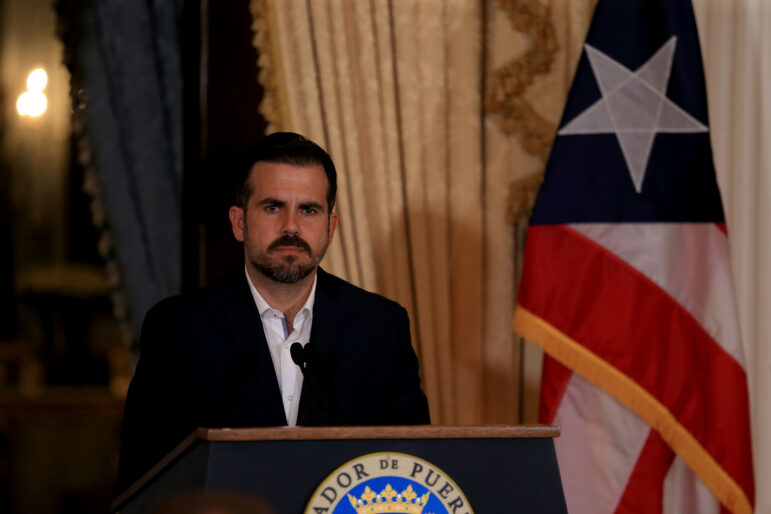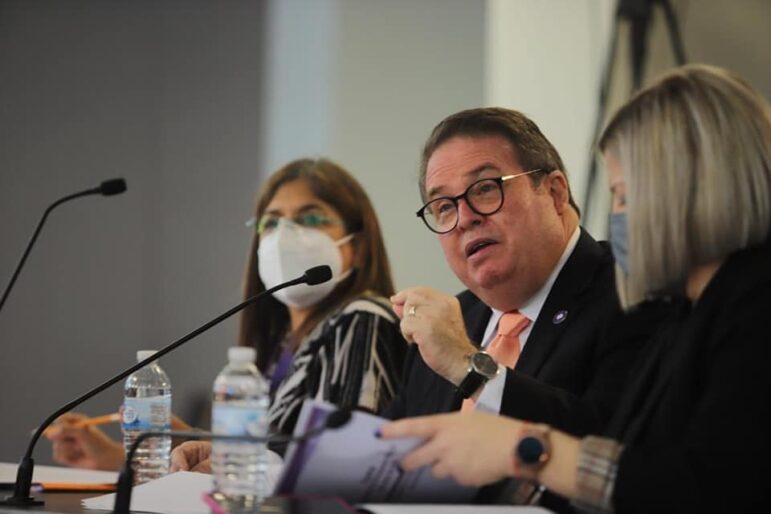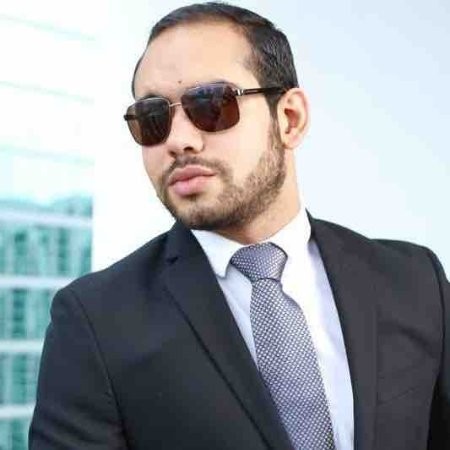In the seven months that followed ex-Governor Ricardo Rosselló Nevares’s resignation, his political committee emptied the coffers and spent more than $300,000 of the money received from donors to pay for expenses such as a new office in Guaynabo, polls, professional services, and travel debts of the former elected official during his time in La Fortaleza.
The committee paid for services overlooked during the entire campaign, such as $4,275 biweekly to Raymond Cruz Hernández as administrator and the same amount to Javier Oyola Alemañy, as committee treasurer. In total, Cruz Hernández received $53,810, while Oyola Alemañy received $66,275, according to the evidence that the Electoral Comptroller’s Office (OCE in Spanish) received from the committee, one-page invoices that exclude details of the work done and the number of hours worked. Before the summer of 2019, neither of them had invoiced the Rosselló Nevares committee for their services, according to official records.
The same day that he announced that he was resigning as governor on July 24, Rosselló Nevares’s committee paid more than $68,000 to rent and set up an office in Metro Office Park in Guaynabo, nearby San Juan. In October 2019, he paid more than $36,900 for a poll when Rosselló Nevares was considering returning to the political arena just three months after his resignation. In November and December 2019, the committee paid $2,250 to edit and translate the biographies of the former governor and his wife, Beatriz Rosselló Areizaga, and $3,600 to manage social media.

Photo by Gabriel López Albarrán | Centro de Periodismo Investigativo
Rosselló Nevares did not respond to questions from the Center for Investigative Journalism (CPI, in Spanish) for this story, which examined more than 200 transactions, invoices, and canceled checks for expenses made by the former governor’s campaign committee since January 2019.
The OCE gave the CPI access to the documents, except for one period: the Summer of 2019. The report for this period was the last that the former official submitted as a candidate for governor and includes two payments of $90,000 for media advice from D.R. Consulting Corp., one of the companies linked to the producer and today convicted Sixto Díaz Colón.
This past Monday, the CPI sued the OCE to gain access to these documents, after the agency refused their delivery on multiple occasions. Judge Alfonso Martínez Piovanetti called a hearing for May 2 at 2 p.m. The OCE insists that the information the CPI requested is part of an ongoing investigation at the Department of Justice, so it must remain confidential.
Justice not investigating any public official
Since 2019, payments to D.R. Consulting — carried out just a few days after the publication of the Telegram chat on July 13 — were referred by the OCE to the Department of Justice and the Federal Bureau of Investigation (FBI). According to the OCE, the federal agency’s investigation ended in the filing of charges against producer Díaz Colón, while a Justice investigation remains open. The Puerto Rico Office of the Special Independent Prosecutor’s Panel (OPFEI, in Spanish) has never been notified by Justice about this investigation, Panel Chair Nydia Cotto Vives confirmed.
By law, the Secretary of Justice had 15 working days from receiving a complaint or information to notify OPFEI that he would launch a preliminary investigation on any official. That did not happen, Justice Secretary Domingo Emanuelli said, because the agency does not investigate any official to whom the Special Independent Prosecutor’s law applies.

Photo taken from Facebook
“[It was not notified] For a simple reason, there are no public officials here — identified so far — who are the ones identified by the OPFEI,” the head of Justice told the CPI.
The federal file of the case against Díaz Colón shows that Rosselló Nevares authorized the hiring and payment of D.R. Consulting with money from the political campaign committee. That same file reveals that — at some point — those who intervened or knew about that agreement included the former special aid in La Fortaleza, Raymond Cruz Hernández; the Chief of Staff, Ricardo Llerandi; the former Secretary of Public Affairs, Anthony Maceira; and the former director of the Puerto Rico Federal Affairs Administration (PRFAA), Carlos Mercader, although by the summer of 2019 he was no longer in that position.
Even though Justice received a referral from the OCE to investigate this case, Emanuelli told the CPI that he referred the D.R. Consulting contract in 2021 to the agency’s Public Integrity division after the host of the “Jugando Pelota Dura” television show, Ferdinand Pérez, spoke to him about the matter.
“That investigation is still ongoing, that investigation is a complex investigation, so it can be extended to other areas, where we have used accountants and prosecutors that are very active in that case,” Emanuelli said. “That type of case is so complex that it can take five, four or seven years to conclude. The important thing is that it’s not paralyzed,” he added.
When asked about the status of the OCE referral, he only said in a general way that he remains “in full cooperation and in talks” with the electoral comptroller, Walter Vélez Martínez.
Rosselló Nevares had no team left on his committee
The OCE approved the transactions carried out since July 2019, while the agency audited the donations, expenses, accounts payable and assets of the Rosselló Nevares committee. As a result, the OCE slapped the committee with more than $22,500 in fines — initially $75,085, but the committee accepted the violations, which reduced the amount — and required the return of more than $177,150 in improper donations, including $2,400 to the recently convicted Oscar Santamaría, a major government contractor who pleaded guilty to bribing several mayors.
According to the OCE, the audit process “was delayed due to the Committee’s noncompliance in providing documents and making the required amendments to the income and expense reports within the periods granted.”
Initially, the intention of the Rosselló Nevares electoral team was to dissolve the committee immediately. But after the former governor’s resignation, the committee changed its decision and notified the OCE that it would become one of “undefined candidacy.” This change allowed Rosselló Nevares’s committee to have access to part of the almost $2.5 million in funds that the campaign had at the time of his resignation from the governor’s office on August 2, 2019. If at the end of December 2019 Rosselló Nevares still did not announce his intention to run in the 2020 electoral contest, the committee should be dissolved.
When questioned about the payments that Cruz Hernández and Oyola Alemañy started getting as of the summer of 2019, the electoral comptroller told the CPI that “the reason at that time was that [Rosselló Nevares] was in a difficult situation, he practically no longer had a campaign team, he had those two people and the process in that office took a long time. There were meetings almost every day.”
Flawed electoral law
The official also assured that he has no authority to reject expenses from a campaign committee for their cost or reasonableness, via, for example, the use of tables or pre-established payment scales to compare with the invoiced rates. “We have no way of saying, for example, if they want to buy a car, I can’t tell them to buy a cheap used Toyota or buy a Ferrari,” he said.
The law also allows a political committee contractor to omit details on an invoice regarding the service provided or how many hours they worked.
“In fact, the law says more. They may not have to submit the invoice,” said Vélez Martínez, recalling an amendment to the Political Campaigns Financing Oversight Act in 2018. At that time, a bill by the then Senate President, Thomas Rivera Schatz, which was passed and Rosselló Nevares signed into law, made the law more flexible to only require “a receipt, invoice or evidence of the payment method” that supports each expense.
“The law was amended, and before it said ‘and’, now it says ‘or.’ Before it said. ‘Invoice and canceled check,’ now it says, ‘invoice or payment of canceled check’”, he added.
On March 30, the OCE presented a bill that seeks to give the office greater powers, such as direct access to committee bank accounts, limits on donations from individuals and government contractors, more frequent income and expense reports, and the creation of a new crime: providing false information to the electoral comptroller.
Although the OCE wants to address “the loopholes [of the law] that work against the transparency and legitimacy that campaign financing requires,” with the suggested changes, the proposal does not include re-requiring an invoice for any payment by a political committee.
Treasurer raises flag over boxes shipped to Virginia
Among the thousands of dollars in payments that the committee made in the months prior to its dissolution, treasurer Oyola Alemañy objected to paying for the shipment of some boxes to Rosselló Nevares in Virginia, where he moved to live, “because he believed it was not within the legal framework.” In a letter on paper stamped with a logo that bears the name Ricardo Rosselló in which the Puerto Rican flag forms the “R” of his last name, Isaira Ortiz García — whose role in the Committee was not specified in the letter — relieved Oyola Alemañy “of all responsibility” for the content of the boxes sent to Virginia on August 22, 2019.
“Any claim for the contents of those boxes is not Mr. Oyola’s responsibility because he believed it was not within the legal framework. That Mr. Javier Oyola Alemañy was not present during the packing, preparation, closing and shipping of said boxes, so, he is totally and absolutely unfamiliar with the content and origin of the content of said boxes,” Ortiz García stated in the letter dated September 25, 2019, and that is in the file that the OCE is keeping.
Oyola Alemañy died from a heart condition in April 2020, during the committee’s dissolution process, the OCE audit, and the FBI and Justice investigations regarding the campaign committee.
Despite Oyola Alemañy’s warning about the possible illegality of the shipment, the electoral comptroller acknowledged that the letter was not part of the documents referred to Justice.
The contents of the boxes are unknown. Vélez Martínez said the information his office received from the committee was that the boxes contained documents from Rosselló Nevares “in his official capacity.”
The CPI tried to contact Ortiz García, who made the shipment but got no response.
Ortiz García paid $1,469.50 to send the boxes, and was reimbursed by the committee, as reflected in the Income and Expense Report for the October-December 2019 quarter. The description of the transaction is “reimbursement for sending political and campaign strategy documents.”
In the letter that is in the OCE’s file, Ortiz García states that what was sent to Rosselló Nevares in Virginia is “part of his work documents for his campaign.”
“Mr. Javier Oyola Alemany was told that the contents of these boxes were Mr. Ricardo Rosselló Nevares’s property because they were materials intrinsic to his candidacy for a political position to be determined by the electoral controller,” the letter added.
The letter does not explain why the treasurer of the committee, who was a lawyer, believed that sending this material to Virginia, where Rosselló Rosselló Nevares lived, could be illegal.
In the OCE committee files, there is no record that Oyola Alemañy objected to the first shipment that Ortiz García made to Virginia of two boxes and whose recipient was the resigning governor’s mother, Irma M. Nevares. The package was shipped via FedEx at a cost of $422.90. The claim for that refund was recorded in the Income and Expenses Report for the quarter from July to September 2019 and the description was “reimbursement for sending campaign documents to the candidate.”
After the resignation, the committee moved to a new office
On July 24, 2019, the same day that Rosselló Nevares announced his resignation as governor, his political committee signed a one-year lease for a new office in Metro Office Park (in Guaynabo), paying $43,685.48 in advance. The lessor was Twenty-One Century Building, a company that identifies Andrés Guillemard Ginorio — to whom the committee had to return $5,400, according to an electoral report — and attorney Gilberto Marxuach as authorized persons. The rental agreement has the latter’s signature.
The advance payment was because “news that was coming out” concerned the landlord, who questioned the committee’s ability to pay rent later, according to the Election Comptroller.
“If my memory doesn’t fail me, the year wasn’t used up and they were reimbursed part of the unused rent,” the official said.
That refund, however, does not appear in the committee’s reports for the period.
Electricity bills that Twenty-One Century Building submitted showed that the office was in use from September 2019 to March 2020.
The expense reports and invoices from Roselló Nevares’s undefined electoral committee show that this office incurred in repairs and remodeled doors, carpets, was furnished, equipped, and had signage. Now, there’s a medical device company there, according to its corporate documents.
Vélez Martínez added that the “[OCE’s] auditors took an inventory of the equipment purchased with campaign donations” and that when the office closed, the purchased equipment was returned to OCE, which, in turn, donated it to other agencies, such as the Department of Education and the Department of Sports and Recreation.
Donors paid for trips, vacations, and floral arrangements
In the summer of 2019, former Governor Rosselló Nevares used campaign funds to pay $5,076.05 for plane tickets for his family vacation in Europe, which he canceled after several arrests took place in Puerto Rico for corruption in his administration.
After the Telegram chat was published and during the protests calling for his resignation, the Rosselló Nevares committee also paid $6,623.27 for three nights — from July 17 to 20 — in a junior suite at the San Juan Sheraton Hotel that cost more than $1,600 per night. The bill — payable to Raymond Cruz Hernandez — does not detail who used this room that charged nearly $300 in food and alcohol.

Photo taken from LinkedIn
The tickets for Rosselló Nevares and the former first lady when they left for Florida on August 2, before continuing to Virginia, were also paid for with committee funds, as were the tickets for Rosselló Arreizaga and their children when they visited Puerto Rico a few months later, in November. For the first trip, $276 were paid with a credit card that covered the cost of the other ticket; those for November were $828 each.
A week after Rosselló Nevares’s exit from La Fortaleza, his committee reimbursed $9,322.32 to Cruz Hernández for having paid, in 2018, for five stays at the exclusive Royal Isabela hotel.
The CPI tried to contact Cruz Hernández but got no response.
“The Committee cannot pay for personal expenses or those of anyone else using money from the committee, since donors made donations to pay expenses for electoral purposes,” according to a footnote to the OCE determination in December 2019 related to the ex-governor’s committee.
According to the Electoral Comptroller, the committee justified the payment for travel and hotels alleging that Rosselló Nevares performed official duties. During the trip to Russia in the summer of 2018, there was an invitation from FIFA to attend the World Cup final. In 2019, even though he assured that his trip was for vacation, he sent an agenda of an activity in Spain in which he allegedly participated while on official duty before continuing his vacation.
“The thing is that if a candidate, for example, has a fundraiser in Washington and decides to travel today for the fundraiser and decides to stay three days and return on the third day, what they do in between is very difficult for us to get into, outside of if we see an expense made for a personal matter. But beyond that, it’s complicated,” said Rolando Torres, who heads the OCE’s audit program.
But while there are limits to what the OCE can do in terms of evaluating expenses, these can never be personal.
Weeks before the Telegram chat was published, Rosselló Nevares’s committee paid more than $1,250 for a dozen flower arrangements, with wine, ranging from $110 to $250 each, according to invoices reviewed by the CPI. The list of recipients included the former mayor of Aguas Buenas, Javier García, former Rep. Néstor Alonso, and the former mayor of Yauco, Abel Nazario, all three convicted in recent corruption cases. Also receiving flower arrangements at that time were New Progressive Party (PNP, in Spanish) Reps. José Torres Zamora and Georgie Navarro — the latter with whiskey instead of wine — as well as House Speaker Carlos Méndez and Senate President Thomas Rivera Schatz.
Rosselló Nevares sent flower arrangements to agencies, the former Justice Secretary and later Governor, Wanda Vázquez Garced, to former Health Secretary Rafael Rodríguez Mercado, to former Housing Secretary Fernando Gil Enseñat, to former Chief Information Officer, Glorimar Ripoll, and the then director of the Public-private Partnership Authority, Omar Marrero.
After the chat was published, in August 2019, the committee paid $978.98 for new flower arrangements, but this invoice is one of the documents that OCE has kept confidential.
Próximo en la serie
2 / 8
¡APOYA AL CENTRO DE PERIODISMO INVESTIGATIVO!
Necesitamos tu apoyo para seguir haciendo y ampliando nuestro trabajo.


